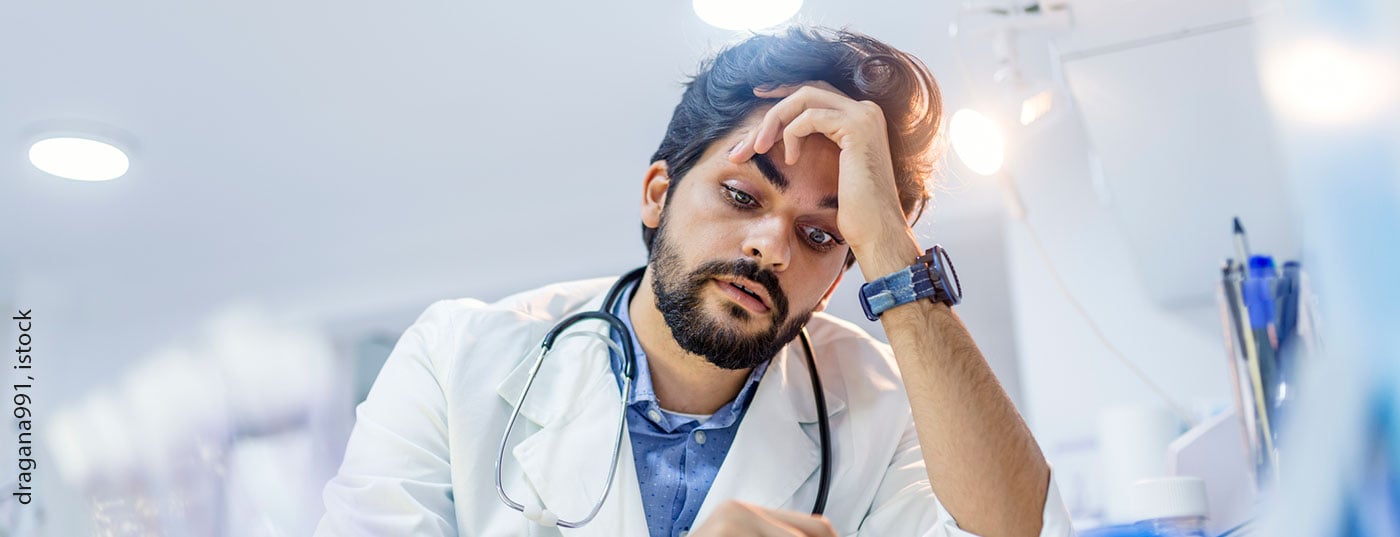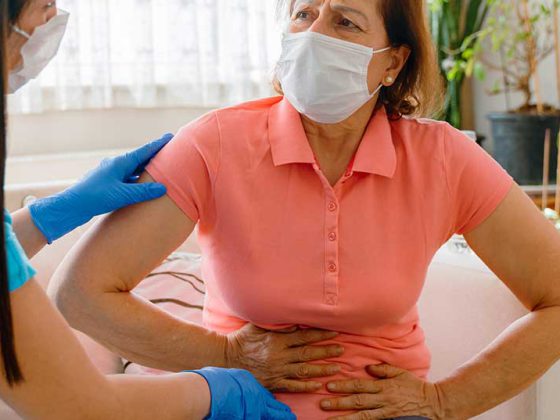Dealing with often serious illness is the most central element of the medical profession. Their own vulnerability is usually in the background. But what if it hits you? How does first-hand experience influence medical practice? And vice versa: How does the profession influence cancer management? We asked someone who should know, and in addition to an interesting conversation, we also received valuable food for thought for daily practice.
Samuel Perri sits in the living room of his family home. The dog, a Weimaraner, is lying on his pillow right next to the radiator, music is playing softly. Samuel drinks tea from a large cup and talks about his illness. A disease that is no longer visible to him today. He is tall, has a neat three-day beard and wears sporty clothes. Three days ago he celebrated his 51st birthday, due to Corona in a small way, only with the family. His two big daughters were visiting, and his wife and 13-year-old son were cooking. Three years ago, Samuel would not have thought he would live to see this day.
At that time, his neuroendocrine tumor was diagnosed. He had been feeling nauseous for quite some time, so he just briefly held the transducer to his liver at his own family doctor’s office, actually without any bad premonition. There were countless space-occupying lesions to be seen and life was upside down. Six months, three chemotherapies and numerous side effects later, he said goodbye to his family, wife, three children, dog. The tumor had spread throughout the body, even breaking out of the skin. He agreed to a last therapy attempt with a checkpoint inhibitor – at that time off-label – more for the sake of his environment. With serious effects, because after only two weeks this showed success and Samuel drew new courage to face life. After another two weeks he went walking again, after three months jogging. And after half a year of work.
New start as “uninsurable
Since he had given up his own practice, Samuel started looking for a job. This proved difficult despite a shortage of physicians in primary care. Employment failed due to his “uninsurability”, often the stints were too high. Finally, however, he found an employer who did not hesitate to take the risk of quickly losing another worker due to a relapse. “A great piece of luck,” Samuel says. He has stayed with her for a good two years now.
When he returned to work, he initially had great reservations, says the experienced family doctor. So he thought he could only be interested in really and seriously ill people. The thought of sitting across from whining patients – themselves far less ill than he – seemed unbearable to him. In practice, however, these concerns were usually not a problem, on the one hand thanks to the routine of past years and on the other hand also because of the small workload of 30% with which he started. He was helped a lot during this time by his supervisor, who slowed him down a bit in his ambition and kept him from re-entering too early and too intensively.
New honesty
Soon after starting his new career, Samuel noticed the impact of his own illness on his priorities as a doctor. “My professional priorities have clearly shifted even more to where they’ve always been,” he says. Thus, he said, rational, honest, and compassionate medicine is even more important to him than it used to be. He also weights the expectations placed on him differently and is better able to cope with not fulfilling them. Excessive actionism is less common today than it used to be, he said, and he can now better tolerate waiting once in a while in the spirit of “less is more”.
Samuel, who had the disease himself without any risk factors, is a non-smoker, a low drinker, slim and physically active, takes a somewhat more relaxed view of prevention after his illness. As a person and as a doctor. “Even with the healthiest lifestyle, we are not immune to disease and premature death. Of course, we have a responsibility to take care of life, but in doing so, life itself should not fall by the wayside,” he says. When asked whether he has now become a better doctor, he has only a weary smile. In any case, he is now more familiar with the field of oncology. No, seriously, he had become more honest. And more critical. So he deals with what he sees as the biggest dilemma in general practice differently today than before he became ill: “For me, ethics in medicine is linked to sound knowledge. Knowledge and what we can offer patients is growing faster than any individual can learn. Today, I also say more easily than I once did that I just don’t know, but we can ask someone else, for example.”
The bottom line is that Samuel still loves his job. Only sometimes, when he’s not doing so well, does he wish he had a job where he could be silent. “Having to communicate can be very tiring, especially when you’re also the doctor – the healthy one in the situation.” He will never forget how, right after his re-entry, a patient persistently asked questions about various herbal prostate medications, their advantages and disadvantages, while he himself was waiting for the MRI results of a follow-up examination. In such moments, when he feels the need to withdraw and cannot do justice to the patients, Samuel also becomes aware of the negative impact of his illness on him as a doctor. These become especially noticeable when anxiety plagues him.
Knowledge as an advantage and disadvantage
As much as being a physician can be a tremendous advantage in dealing with and managing one’s own disease, it can also be frightening. Because Samuel knows what is now possible, but also how limited our options still are. On the one hand, he says, it is an enormous relief for him to be less susceptible to what he calls alternative-medicine puffery and to be able to dispense with scientifically dubious methods such as high-dose vitamin C without a guilty conscience. On the other hand, he said, his training and professional experience also force him to be realistic about his prognosis; in some cases, he lacks confidence in his doctors. An instinct that has potentially saved his life, but to which countless sleepless nights are also owed. If he had not changed doctors, he would probably be dead. Without anyone having made a mistake. “If I weren’t a doctor and had had various contacts in the field before, I wouldn’t be sitting here today. Orthodox medicine offers fantastic possibilities, but they are far from being equally accessible to everyone. Not even in Switzerland. For me, a good doctor is not only well-founded knowledge, but also knowledge of one’s own limits and openness to ask colleagues.”
Cancer further strengthened Samuel’s conviction in conventional medicine, but also made him aware of its limitations and rediscover his spirituality. A process that might have been more difficult for him than for others due to his scientific background. In the context of his illness, he said, he applied what he learned in childhood and adolescence from his Catholic grandmother and Buddhist uncle and had valuable conversations with a Reformed pastor. Today he is convinced that spirituality offers help that medicine, including psychooncology and psychiatry, is unable to provide.
The most important thing at the end
Samuel is satisfied and infinitely grateful for his “second life”. As a doctor, as a man, as a father, as a human being. Last but not least, we want to let him have his own say:
Samuel, what would you like all oncologists to take away?
Samuel Perri: I think everyone would answer that question a little differently. I can think of four things I would like to mention:
- Knowledge is ethics. And it is currently difficult to stay up-to-date due to the rapid growth in knowledge. Courage to use off-label therapy saved my life. You can only do something like this if you are a doctor who is well versed in his or her field.
- If a patient wants to talk to you about dying, please do!
- Ensures privacy during chemo! Patients receiving chemos are in a state of emergency. The spatial settings of chemotherapy are still largely an imposition today. Suppressing one’s own tears while the patient opposite has to expose her port and removed breasts as a matter of course, listening to diarrhea details from another patient while the toddler of another patient stands around between the couches and almost breaks my heart and a fifth patient makes his business phone calls is unfortunately not an invented scenario.
- And, I have met excellent and compassionate onco-nurses. Your job cannot be appreciated enough!
InFo ONCOLOGY & HEMATOLOGY 2021; 9(1): 22-23.











